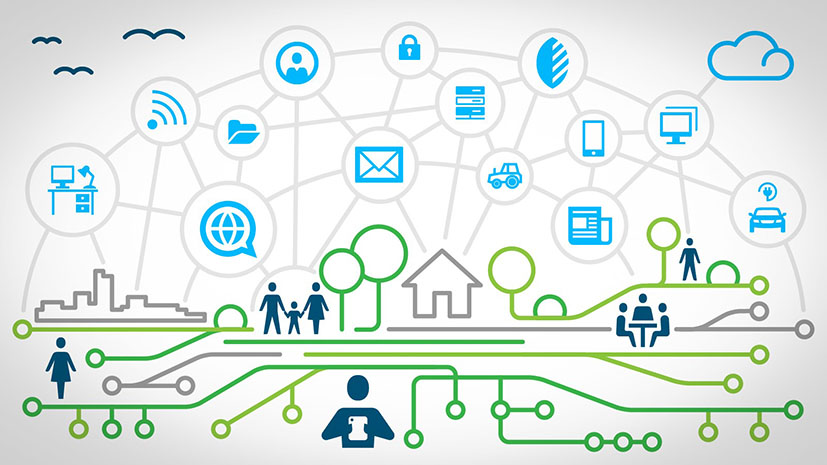How can participation processes in rural areas be designed digitally?
This question is the focus of the research project "Perspectives and possible applications of digital participation processes in rural regional development" (DigiBeL). The Institute for Rural Development Research (IfLS) and the Institute for Communication and Media Studies in Leipzig are investigating how digital procedures for the participation of citizens can be used or made more effective in the implementation of regional development processes in rural areas.
From 2020 to 2023 we will study how analogue formats can be sensibly and effectively combined with digital formats. In addition to an online survey of various actors in rural development processes, case studies in rural regions of Germany will provide information on the factors influencing the acceptance and impact of the use of digital methods. Together with the actors, best-practice examples are identified and approaches for action are developed.

The project is based on the profound changes in the course of digitalization and the widespread use of digital platforms to involve citizens in decisions and procedures. This is accompanied by changes in cohesion and communication in rural areas.
The integration of new communication technologies can help to bridge spatial differences, strengthen competitiveness and make processes in rural regional development more efficient and participatory.
The project contributes to the work of the Federal Ministry of Food and Agriculture and the practice of rural development. Within the framework of the Federal Programme for Rural Development (BULE), it develops approaches for improving rural regional development processes.
The results of the study will be made available to the public here on the project website. Further information on participation in the online survey or case studies is also available here.
The research project is funded by the Federal Ministry of Food and Agriculture within the framework of the Federal Programm for Rural Development (BULE).
The research project is divided into a total of 6 working modules, executed in cooperation between the project partners.
Working module 1: Coordination and stakeholder involvement
Coordinating the work process between the project partners includes the systematic integration of stakeholders.
For this purpose, not only the progress and results of work are discussed within the project partners, but also dialogues with scientific, political, and public interest groups are organized in order to ensure the mutual exchange of knowledge and its relevance.
Working module 2: Theoretical and conceptual framework
The aim of the working module is to get an overview of the theoretical discourse on the role of digitalization in regional development processes and related topics in order to develop the conceptual research framework, which is also the basis of the research project.
For this purpose, interdisciplinary literature will be systematically collected and evaluated with the help of a guideline. For the evaluation, publications on research in Germany will be analyzed and compared and linked to English-language literature that deals particularly with other European regions. In supplement, a content-analytical grid will be used for evaluation, according to subject areas, theories, cases and results.
Based on this, the research framework will be derived to capture and conceptually substantiate the relationship between socio-spatial scope for action and mediatization dynamics.
Working module 3: Online survey
With recourse to the theoretical and conceptual framework, an online survey will be conducted on selected issues. The aim is to collect the current practices of process design in regional development, the previous experiences with linking digital and analogue technologies, and the specifics of the respective regions.
The survey is intended to address different stakeholders in various regional development processes in Germany (e.g. from the EU funding program LEADER, IRD, specific model regions like Land(auf)Schwung) and to request their participation in the survey in order to obtain the most comprehensive assessment possible of the potentials and previous experiences with digitalization in such processes and to ensure the validity of the results.
Working module 4: Conducting in-depth case studies
Based on the findings of the online survey, the next step is to select different case study regions in Germany in order to examine selected aspects in more detail, for example the effects of participation formats or skills in the use of digital techniques.
By using a common guideline and the derivation of specific questions together with the stakeholders, an empirical approach is to be developed which covers the diversity of the regional development processes as well as their different progress and process durations.
In this exchange process, additional insights will be gathered and experiences and needs will be identified that are relevant in practice and further research. This allows to identify best practice examples and to develop integrated practical approaches.
Working module 5: Comparative analysis and recommendations for action and policy
The results of the empirical research will be processed in order to develop - together with various stakeholders - a guideline for decision-makers from the municipalities, civil society, policy and also the economy. The core of this working module is the comprehensive integrative concept, which the project partners will develop with representatives of different target groups and experts according to their expertise.
Working module 6: Dissemination and transfer of knowledge
It is not only necessary to generate new stocks of knowledge, but also to communicate and share them with civil society. In order to ensure this, the research project uses various target group-oriented channels and media from the very beginning. In addition to the project website, these include, for example, the ongoing support of the research project through a podcast format, publications for a scientific and practice-oriented audience, contributions to various events such as conferences and multiplier events, and networking and cooperation with actors in (scientific) regional research.
Information on the project as well as the main results will be made publicly available during the project period. Additionally, their accessibility beyond the duration of the project is ensured.
DigiBeL is a cooperative project of the Institute for Rural Development Research at Goethe University Frankfurt/Main and the Institute for Communication and Media Research at the Leipzig University.
Project period: 01.04.2020 to 31.03.2023
Institute for Rural Development Research at Goethe University Frankfurt/Main, Department: "International perspectives, agricultural policy and rural development": Simone Sterly, Kurfürstenstraße 49, 60486 Frankfurt am Main. sterly(at)ifls.de | Website IfLS
April 2020 – March 2023
The research project is funded by the Federal Ministry of Food and Agriculture within the framework of the Federal Programm for Rural Development (BULE).

